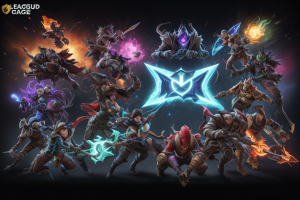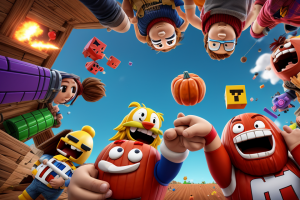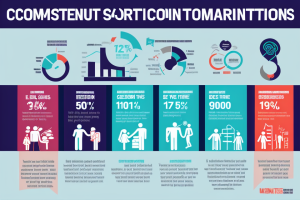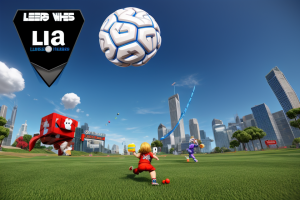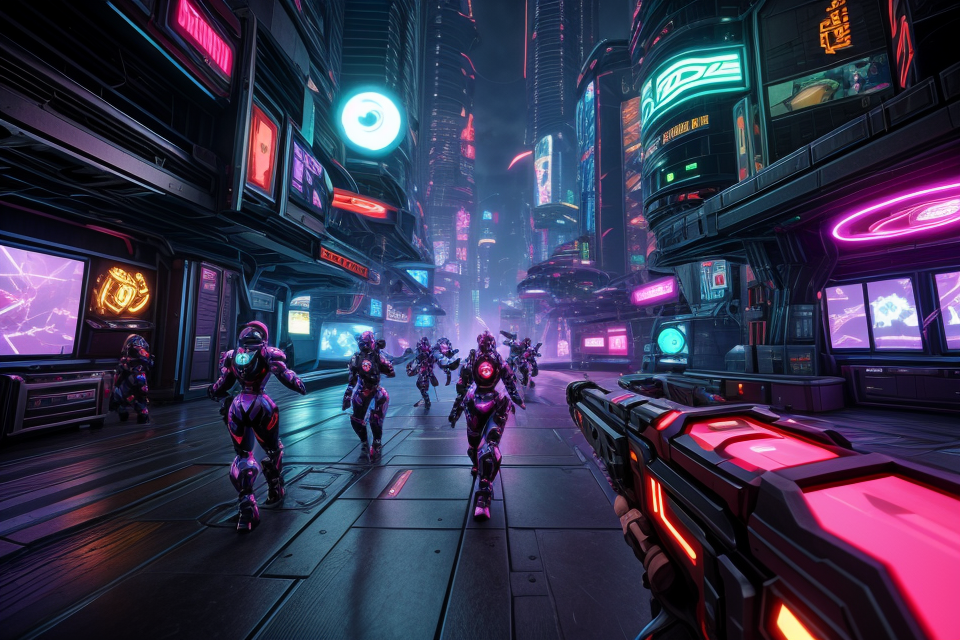
Teamwork games are a genre of video games that emphasize cooperation and communication between players to achieve a common goal. These games require players to work together, utilizing their unique skills and abilities, to overcome challenges and defeat enemies. Whether it’s saving the world from a zombie apocalypse or building a successful business, teamwork games offer a thrilling and immersive experience for players of all ages and skill levels. In this comprehensive guide, we’ll explore the exciting world of teamwork games, including their history, gameplay mechanics, and the benefits they offer for players. So grab a friend, grab a controller, and get ready to embark on an adventure like no other!
Understanding Teamwork Games
Definition of Teamwork Games
Teamwork games are a subgenre of video games that emphasize cooperation and collaboration between players to achieve a common goal. These games often require players to work together to overcome challenges, solve puzzles, and defeat enemies. In teamwork games, success is not just determined by individual skill, but also by the ability of players to work together effectively.
The Importance of Teamwork in Games
Teamwork is an essential aspect of many games, as it allows players to work together to achieve a common goal. In teamwork games, players must communicate, coordinate, and cooperate with each other to succeed. Effective teamwork can lead to a more enjoyable gaming experience, as players can share their skills and work together to overcome challenges.
Characteristics of Teamwork Games
Teamwork games often have several characteristics that set them apart from other types of video games. Some of these characteristics include:
- Cooperative gameplay: In teamwork games, players must work together to achieve a common goal. This requires communication, coordination, and cooperation between players.
- Puzzle-solving: Many teamwork games require players to work together to solve puzzles or overcome challenges. This often requires players to use their skills and abilities in unique ways to achieve success.
- Strategic gameplay: Teamwork games often require players to make strategic decisions that impact the success of the team. This may involve choosing which skills to use, when to attack enemies, or how to allocate resources.
- Social interaction: Teamwork games often require players to interact with each other in a social setting. This may involve communicating with teammates, coordinating efforts, or working together to achieve a common goal.
Types of Teamwork Games
Sports Games
Sports games are a subcategory of teamwork games that involve physical activity and competition. These games often require players to work together to achieve a common goal, such as scoring points or winning a match. Examples of sports games include basketball, soccer, and volleyball.
Strategy Games
Strategy games are another type of teamwork game that involve making decisions and solving problems as a team. These games often require players to work together to achieve a common goal, such as defeating an enemy or completing a mission. Examples of strategy games include chess, Risk, and Settlers of Catan.
Cooperative Games
Cooperative games are a subcategory of teamwork games that require players to work together to achieve a common goal. These games often involve problem-solving and communication, as players must work together to overcome challenges and obstacles. Examples of cooperative games include Pandemic, Forbidden Island, and The Game of Life.
In summary, teamwork games come in many different forms, including sports games, strategy games, and cooperative games. Each type of game offers a unique experience and requires different skills and strategies. By understanding the different types of teamwork games, players can choose the right game for their interests and preferences, and work together to achieve their goals.
The Benefits of Playing Teamwork Games
Building Social Skills
Teamwork games provide an opportunity for players to develop their social skills, which are essential for success in both personal and professional relationships. By participating in these games, individuals can enhance their communication, cooperation, and conflict resolution abilities.
Communication
Effective communication is the cornerstone of successful teamwork. Teamwork games provide a platform for players to practice their communication skills by working together to achieve a common goal. These games often require players to coordinate their actions, share information, and give and receive feedback. Through these interactions, players can learn how to express themselves clearly, actively listen, and provide constructive feedback.
Cooperation
Teamwork games also promote cooperation, which is essential for achieving success in group settings. Players must work together to achieve a common goal, and this requires a high level of cooperation and collaboration. These games often require players to divide tasks among team members, share resources, and support each other throughout the game. By working together, players can learn how to trust each other, delegate tasks, and compromise when necessary.
Conflict Resolution
Finally, teamwork games can also help players develop their conflict resolution skills. Conflicts are inevitable in any group setting, and teamwork games provide a safe space for players to practice resolving conflicts effectively. These games often require players to negotiate, compromise, and find creative solutions to problems. Through these experiences, players can learn how to manage their emotions, understand different perspectives, and find common ground.
Overall, playing teamwork games can provide numerous benefits for individuals looking to improve their social skills. By participating in these games, players can enhance their communication, cooperation, and conflict resolution abilities, which can help them succeed in both personal and professional relationships.
Improving Cognitive Skills
Problem Solving
Teamwork games can significantly improve problem-solving skills. These games often involve a variety of challenges that require players to think creatively and strategically to overcome obstacles and reach their goals. Players must analyze situations, evaluate options, and make decisions quickly and effectively to succeed.
Decision Making
Effective decision-making is another essential cognitive skill that can be improved through teamwork games. These games often involve a range of complex situations that require players to weigh the pros and cons of different options and make decisions that benefit the team as a whole. Players must also learn to trust their instincts and make decisions under pressure, which can improve their ability to think on their feet and handle unexpected situations in real life.
Planning and Organization
Planning and organization are critical cognitive skills that can be honed through teamwork games. These games often require players to work together to develop strategies, allocate resources, and coordinate actions to achieve a common goal. Players must learn to communicate effectively, delegate tasks, and manage time and resources efficiently to achieve success. Through teamwork games, players can develop valuable skills in project management, leadership, and teamwork that can be applied in a variety of real-life contexts.
Selecting the Right Teamwork Game
Factors to Consider
Number of Players
When selecting a teamwork game, it is important to consider the number of players that will be participating. Some games are designed for large groups, while others are better suited for smaller teams. For example, games like “The Resistance” and “Dead Man’s Draw” are ideal for 5-10 players, while “One Night Ultimate Werewolf” is best played with 4-10 players.
Age and Skill Level
Another important factor to consider is the age and skill level of the players. Some games may be too complex or too simple for certain age groups, so it is important to choose a game that is appropriate for all players. For example, “Forbidden Island” is a great game for younger players, while “Codenames” is more suitable for older players and those with a higher skill level.
Theme and Genre
The theme and genre of the game can also play a role in selecting the right teamwork game. Some players may prefer games with a fantasy or sci-fi theme, while others may enjoy games with a more historical or educational theme. Additionally, some players may prefer games that are more strategic, while others may enjoy games that are more social or lighthearted.
In summary, when selecting a teamwork game, it is important to consider the number of players, age and skill level, and theme and genre to ensure that all players will enjoy the game and have a positive experience.
Recommended Teamwork Games
Board Games
Board games are a great way to practice teamwork, as they often require players to work together to achieve a common goal. Some recommended board games for teamwork include:
- Cooperative games, such as Pandemic or Forbidden Island, where players must work together to stop a disease outbreak or recover treasure.
- Strategy games, such as Carcassonne or Ticket to Ride, where players must make decisions that benefit the group, rather than just themselves.
- Party games, such as The Resistance or One Night Ultimate Werewolf, where players must use their deduction skills to figure out who among them is a traitor or werewolf.
Video Games
Video games offer a unique opportunity for teamwork, as players can communicate and coordinate their actions in real-time over the internet. Some recommended video games for teamwork include:
- First-person shooters (FPS), such as Team Fortress 2 or Overwatch, where players must work together to achieve objectives and eliminate the enemy team.
- Massive Multiplayer Online Games (MMOs), such as World of Warcraft or Guild Wars 2, where players can join forces with others to complete challenging content and quests.
- Real-time strategy games, such as Starcraft or Age of Empires, where players must coordinate their actions to build a base, gather resources, and defeat the enemy.
Outdoor Games
Outdoor games offer a chance to practice teamwork in a physical environment. Some recommended outdoor games for teamwork include:
- Orienteering or navigation games, where players must work together to find hidden checkpoints and reach the finish line.
- Obstacle courses or challenge races, where players must help each other overcome physical obstacles and reach the end of the course.
- Team sports such as soccer, basketball, or flag football, where players must work together to achieve a common goal, such as scoring a goal or winning the game.
Tips for Enjoying Teamwork Games
Building a Positive Gaming Environment
Choosing the Right Attitude
The first step in building a positive gaming environment is to choose the right attitude. It’s important to approach the game with a positive mindset and to be open to learning and growing as a team. Avoid negative self-talk and focus on the team’s strengths instead of their weaknesses. Encourage your teammates to do the same and create a supportive atmosphere where everyone feels comfortable expressing themselves.
Encouraging Teamwork
Encouraging teamwork is key to building a positive gaming environment. Foster a culture of collaboration and cooperation, and make sure everyone feels included and valued. Celebrate team successes and learn from failures together. Encourage communication and open dialogue, and provide constructive feedback to help everyone improve. Remember that everyone has different strengths and weaknesses, and that working together as a team can help everyone grow and improve.
Creating a Comfortable Space
Creating a comfortable space is essential for building a positive gaming environment. Make sure the gaming area is well-lit, comfortable, and free from distractions. Provide comfortable seating and equipment, and ensure that everyone has the resources they need to play the game effectively. Consider creating a shared playlist or music playlist to help set the mood and create a relaxed atmosphere. By taking care of these basic needs, you can help everyone feel more relaxed and focused on the game.
Enhancing Gameplay Experience
Enhancing your gameplay experience in teamwork games requires a combination of skills, strategies, and adaptability. Here are some tips to help you enhance your gameplay experience:
Adapting to Different Roles
One of the keys to success in teamwork games is adaptability. You need to be able to adapt to different roles and responsibilities as needed by the team. Whether you’re playing as a healer, tank, or damage dealer, it’s important to understand the role’s responsibilities and how it contributes to the team’s success.
Adapting to different roles can be challenging, especially if you’re used to playing a specific role. However, it’s important to keep an open mind and be willing to learn and adapt to new roles. By understanding the strengths and weaknesses of each role, you can better contribute to the team’s success.
Learning from Mistakes
No one is perfect, and mistakes are an inevitable part of any game. However, it’s important to learn from your mistakes and use them as an opportunity to improve. Take the time to analyze what went wrong and how you can avoid making the same mistake in the future.
Learning from mistakes can be challenging, especially if you’re feeling frustrated or upset. However, it’s important to keep a positive attitude and use your mistakes as an opportunity to learn and grow. By learning from your mistakes, you can become a better player and contribute more effectively to the team.
Experimenting with Different Strategies
Experimenting with different strategies is an essential part of enhancing your gameplay experience. Whether you’re playing a cooperative game or a competitive game, it’s important to try out different strategies and see what works best for you and your team.
Experimenting with different strategies can be exciting, especially if you’re trying something new. However, it’s important to keep in mind the team’s goals and how your actions contribute to the team’s success. By experimenting with different strategies, you can find new ways to approach the game and improve your overall gameplay experience.
Reflecting on the Joys of Teamwork Games
Personal Growth
Reflecting on the joys of teamwork games offers an opportunity to recognize personal growth. Playing these games encourages collaboration, communication, and problem-solving skills. As individuals work together towards a common goal, they develop their interpersonal and intrapersonal abilities. This growth is essential in both personal and professional life, enhancing relationships and fostering a sense of accomplishment.
Social Interaction
Teamwork games also provide a platform for social interaction. Playing with others encourages the development of social skills, such as empathy, active listening, and cooperation. These games enable individuals to connect with others, share ideas, and build camaraderie. Social interaction is crucial for fostering a sense of community and belonging, leading to long-lasting friendships and a stronger support system.
Memorable Experiences
Reflecting on the joys of teamwork games also highlights the memorable experiences that come with playing them. These games often create a shared experience that players can look back on and reminisce about. Memorable experiences are an essential aspect of teamwork games, as they contribute to the overall enjoyment and satisfaction derived from playing. These experiences can range from successfully completing a challenging task to overcoming obstacles as a team, fostering a sense of accomplishment and pride.
Looking Forward to the Future of Teamwork Games
Reflecting on the joys of teamwork games also involves looking forward to the future of these games. As technology continues to advance and new games are developed, the possibilities for teamwork games are endless. Players can anticipate new and exciting experiences, challenges, and opportunities for growth. The future of teamwork games promises to be an exciting journey, with new adventures and experiences waiting to be discovered.
FAQs
1. What is a teamwork game?
Teamwork games are video games that emphasize cooperation and communication between players to achieve a common goal. These games require players to work together to overcome challenges, complete objectives, and defeat enemies. Teamwork games can be played online or offline and can be played with a variety of different game genres, including first-person shooters, role-playing games, and strategy games.
2. What are the benefits of playing teamwork games?
Playing teamwork games can have a number of benefits, including improved communication skills, increased problem-solving abilities, and enhanced social interactions. Teamwork games also promote a sense of community and collaboration, which can be valuable in both personal and professional settings. Additionally, teamwork games can be a lot of fun and provide a sense of accomplishment when objectives are completed successfully.
3. What are some popular teamwork games?
There are many popular teamwork games, including games like League of Legends, Overwatch, and Fortnite. These games have large player bases and offer a variety of different game modes and play styles. Other popular teamwork games include Apex Legends, Tom Clancy’s Rainbow Six Siege, and Rocket League.
4. How can I improve my teamwork skills in games?
Improving your teamwork skills in games can be done by practicing good communication, being open to feedback, and being willing to adapt to different play styles. It’s also important to stay focused and attentive during gameplay, and to be proactive in offering help and support to your teammates. Additionally, watching tutorials and streams can help you learn new strategies and techniques for playing teamwork games.
5. Are teamwork games suitable for all ages?
Teamwork games can be suitable for all ages, but it depends on the specific game and its content. Some teamwork games may have mature themes or violence, so it’s important to do your research and make sure the game is appropriate for your age group. Additionally, some teamwork games may have strict age requirements, so it’s important to check the game’s rating and age restrictions before playing.
